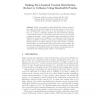20 search results - page 1 / 4 » Making Eigenvector-Based Reputation Systems Robust to Collus... |
WAW
2004
Springer
15 years 7 months ago
2004
Springer
119
click to vote
ICDCS
2007
IEEE
15 years 8 months ago
2007
IEEE
Peer-to-peer networks often use incentive policies to encourage cooperation between nodes. Such systems are generally susceptible to collusion by groups of users in order to gain ...
113
click to vote
SIGECOM
2004
ACM
15 years 7 months ago
2004
ACM
Lack of cooperation (free riding) is one of the key problems that confronts today’s P2P systems. What makes this problem particularly difficult is the unique set of challenges ...
113
click to vote
ICISS
2009
Springer
15 years 8 months ago
2009
Springer
Many peer-assisted content-distribution systems reward a peer based on the amount of data that this peer serves to others. However, validating that a peer did so is, to our knowled...
125
click to vote
IPPS
2006
IEEE
15 years 8 months ago
2006
IEEE
Rational and selfish nodes in P2P systems usually lack effective incentives to cooperate, contributing to the increase of free-riders, and degrading the system performance. Variou...


